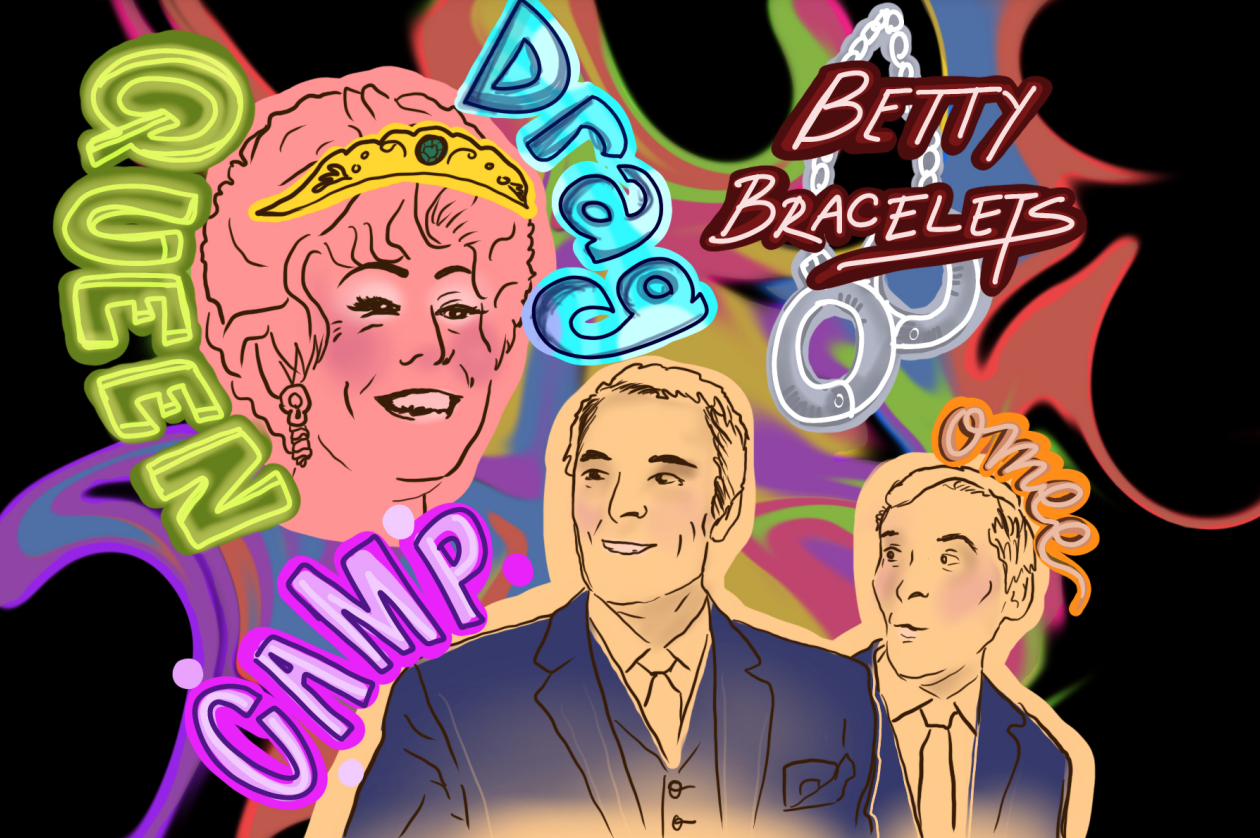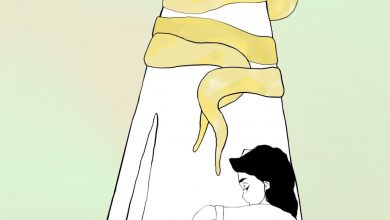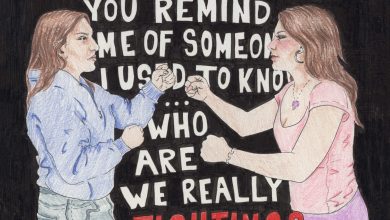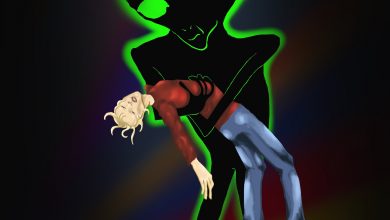Polari: Language and Queer Identity

Design by Cass Sanchez
Image description: A colorful illustration on a black background with the Polari words ‘queen,’ ‘camp,’ ‘drag,’ ‘betty bracelets,’ and ‘omee’ swirling around the smiling heads of queer figures.
“You’ve got a tatty gaff
And all your drag is naff
But I love your bona eek
What’s more your riah’s cod
And all your pots are odd
But I love your bona eek.”
To most people, the lines above amount to little more than poetic gibberish, but to a select (and dwindling) population, this excerpt uses a language of drag queens, gay bars, and theater, a language with strong ties to queer identity. These lines are from “Bona Eek,” a song performed by drag queen Lee Sutton, sung in Polari.
Polari is a language variety that had its heyday in the gay subculture of 1950s and 1960s in the United Kingdom. Some of its terms, such as drag, butch, fab, and camp are familiar to many of us today, while others, such as riah (hair), omee (man), and luppers (fingers) seem foreign, and that’s partly because they are. Though fundamentally a dialect of English, Polari lexicon is derived from influences including Italian, French, Cant, backslang, Romani, Cockney rhyming slang, Yiddish, and American Air Force slang.
Linguistic crossover occurs when languages exchange and adopt words and other characteristics, so linguistic influences can reveal connections and overlaps between different social groups. Queer people have been excluded from historical narratives; their stories are often overlooked or actively repressed. Historical linguistics, the study of language change and relationships between languages, can be a way to challenge erasure by uncovering these hidden and unrecorded interactions through identifying linguistic influences.
In the case of Polari, the language was born from the interactions of people from diverse social, cultural, and linguistic backgrounds. It evolved from an earlier form, called Parylaree, spoken by “circus entertainers, prostitutes, traveling market sellers, beggars, and sailors.” Queer people have long been associated with theater and entertainment. Ports were a hot spot for gay male sex work, and there was significant contact between sailors and gay men. Paul Baker is a professor of linguistics at the University of Lancaster. In his book Polari – The Lost Language of Gay Men (2002), he describes how, during World War II, American air force men were stationed in the UK, and many of their slang words entered Polari’s lexicon, too.
At the height of Polari’s popularity in the 50s, homosexuality was criminalized in the UK and would continue to be until the partial decriminalization of homosexuality in 1967. The years after World War II saw a rise in arrests and prosecution of gay men. Baker (2002) describes how gay men’s identities were stigmatized in the press, and they were often targets of violence, police brutality, and horomone treatments attempting to “cure” their homosexuality.
In the face of such a hostile society, gay men developed a means of communicating without making themselves targets. Thus, Polari became a code to obscure their own identities and activities and also a way to identify other gay men without putting them at risk of homophobic attacks. If a Polari speaker wanted to know if someone else was gay, they could talk to them, slipping in a few Polari words. If the person was gay, they would reciprocate the Polari, and if they were straight, the code would go over their head.
Polari was mostly opaque to those who were not familiar with it (e.g. Bona to vada your dolly old eek! = Nice to see your pretty old face!), allowing for covert public conversations about taboo topics.
In addition to excluding non-speakers from conversation, Polari reflected and shaped its speakers’ own identities. The connotations of many slang words reveal the way Polari speakers viewed themselves and the world. One word that appears time and time again in writing about Polari, as well as appearing in the everyday language of its speakers, is camp, meaning funny, exaggerated, or flamboyant. Polari’s lexicon reflects a worldview that was camp, ironic, and sarcastic. In his book Fabulosa! The Story of Polari, Britain’s Secret Gay Language (2019), Paul Baker describes Polari as “playful, quick and clever–it’s a constantly evolving language of fast put-downs, ironic self-parody and theatrical exaggeration.” It made light of serious issues to challenge the hostile attitudes around homosexuality in the 20th century.
Polari has many words to refer to the police, notably often feminizing: lilly law, betty bracelets, orderly daughters, hilda handcuffs, and others. Feminizing language is a widespread pattern in Polari, most often to refer to gay men as a reflection of their own identities. In the case of the police, the function of feminization may have been a way of defanging the enemy or challenging their masculinity.
The way Polari speakers referred to themselves and each other revealed their understanding of their own identities. Feminization was not limited to the “enemy.” Pronoun substitution was a common form of feminization. Speakers sometimes substituted first-person pronouns “I” and “me” with Your mother. Likewise, Baker (2002) notes that masculine pronouns “he/him” were often substituted with feminine “she/her,” a practice which “feminizes and familiarizes” the subject. Polari speakers also often referred to themselves and each other as queens. Not only is this a feminizing term, but it reflects a camp worldview with its ironic self-aggrandizement. The term drag queen comes from Polari, drag being the general word for clothes and queen referring to Polari speakers.
Polari spoke with exaggerated intonation and characteristics associated with femininity. As Paul Baker puts it, “Polari, then, with its exaggerated exclamations and its dears and duckies and empty adjectives (bona!), feels like a hyper-realized version of stereotypical women’s speech—a parody of how women talk taken to a hilarious extreme—a linguistic form of drag.”
One of the most common Polari words which speakers used to self-identify is omee-palone, literally “man-woman.” The term omee-palone perhaps reveals more about the way Polari speakers perceived their gender identity than their sexual identity.
When it comes to sociolinguistics, one thing that many people have become increasingly aware of is the importance of language in recognizing and respecting others’ identities. Inclusive language, pronouns, and labels are all common topics of political discourse. Labels are an easy shorthand to tell people about your identity. They are a way of broadcasting your identity to the world.
Not only is language a mirror of individual identity, but dialects signify group belonging. Polari, like other dialects, was a way of identifying with others who share something in common.
Polari demonstrates how language is malleable. If a language lacks a word to describe an important idea (such as an identity or activity), speakers have the power to create new terms to describe it. This type of linguistic innovation has been happening for as long as language has existed, and will continue for as long as language continues to exist.
To hear what Polari sounded like, the short film “Putting on the Dish” is a modern example of reconstructed Polari.
Source: Youtube




